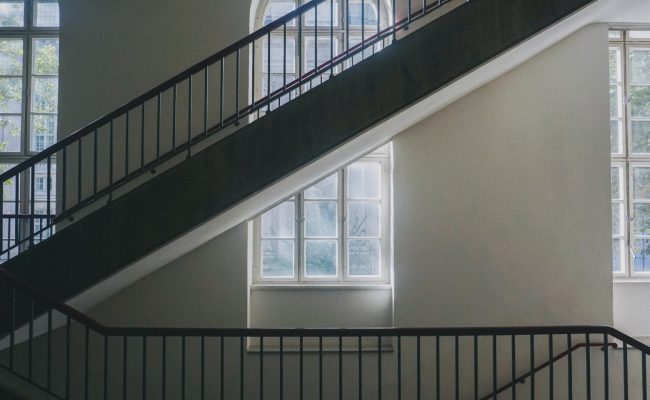It was 1990. Cassette tapes were still widely used. Sylvie Greenhalf was ten.
Sylvie’s father wanted her to be a lawyer. Her mother wanted her to be a doctor. Her parents had divorced before she could speak in full sentences and they still fought bitterly over Sylvie’s future.
Sylvie liked being ten. It meant she was grown-up enough to know about people and lying and deceit and misplaced intentions. But Sylvie wasn’t old enough to pay rent, nor work for pay. She didn’t have to worry about affording food for meals or having somewhere to sleep. She could simply go to school and read books from the library and play in the construction site in the street behind her mum’s house.
Sylvie was small enough and light enough to scale the drainage pipe of any two-storey building and squeeze through a bathroom window. She could move through a stranger’s house—quiet as anything—and open the front door to let herself out, or her father in. Mostly she did both, leaving her father inside while she left to wander the streets.
Sylvie wasn’t sure why people left their bathroom window unlocked. When she grew older, she thought, this would be one thing she would never do.
…
It was 1990. Cassette tapes were still widely used. Bomber jackets had made a comeback. Denim shorts were worn over tights. The Gulf War had not yet begun. Sinéad O’Connor was singing from inside every radio. Sylvie Greenhalf was ten.
At Sylvie’s school, pretty equalled Emma Blueyonder. Emma had blue eyes, light-brown freckles, a small nose and long strawberry-blonde hair. Apart from Emma Blueyonder, pretty also equalled boring. If you were pretty, you weren’t allowed to race centipedes or climb trees or make sandcastles or pretend to be a sloth on the monkey bars. Pretty girls were permitted to sit on a bench and giggle.
Sylvie never giggled. If she found something funny she would throw her face skyward and mouth at the clouds like a fledgling begging for food.
…
It was 1990. Red high-top sneakers were worn folded down at the ankle. Undercuts were the height of fashion. Nelson Mandela had been freed. Sylvie didn’t yet know what escalation meant, nor voyeurism. Cassette tapes were still widely used. Sylvie Greenhalf was ten.
Sylvie’s father was named Tom.
Sylvie’s mother was named Essie.
Sylvie’s parents hadn’t spoken civilly since their divorce. They preferred to yell and fight and transfer their hate in spiteful packages via Sylvie.
When Sylvie’s father brought home gifts they were usually things Sylvie couldn’t use, like rings that didn’t fit her fingers, earrings she hadn’t anywhere to dangle or necklaces that were too heavy for comfort. On occasion her father would bring her a real treasure, like a seashell that glistened in the light, a stone that turned bright red when wet, or an old bit of driftwood with a face carved into it. One time her father brought her an iron cauldron the size of a large apple. Sylvie filled the cauldron with her favourite stones, added a couple of coins she had found on the street, and buried her loot under her mum’s house.
It wasn’t long past her tenth birthday that Sylvie started waking in the night to find her father standing at the end of her bed. His face was as dark as violence.
…
It was 1990. Jeans were worn rolled wide at the cuff. Cassette tapes were still widely used. Bob Hawke was the Prime Minister. Sylvie’s father was not yet in jail. Feminists were hated. Sylvie Greenhalf was ten.
Sylvie remembers a cloudless sky teeming with unresolved turmoil on the afternoon her father asked her to climb the drainpipe at Emma Blueyonder’s house. The drainpipe led to Emma’s roof, but halfway up Sylvie pushed through a small window left ajar above Emma’s staircase.
It was cool and dark inside. Emma’s ceilings were so high Sylvie imagined they would call back to her if she yelled up at them. The floors were covered in a soft carpet, lush with red and yellow flowers.
Emma was alone in the lounge room downstairs watching television. Sylvie could see the green light from the box flicker against the walls of the darkened room. She slunk down the stairs and stood in the doorway for a time watching Emma enthralled by the moving images on the screen. Sylvie remembered later how serene Emma had looked that afternoon and how still she had been as she sat there, curled up in the hug of a large leather sofa.
Sylvie crept to the front door and opened it for her father, who stood concealed in the dense foliage of Emma’s front yard. Tom walked toward the open door, patted Sylvie on the head and went inside. Sylvie shut the door behind her and walked down the cobblestoned laneway that skirted Emma’s house toward the open gate at the back of their primary school. Sylvie looked into people’s back yards as she made her way toward the school. At one house she spied a part of someone’s head through a knot hole in the wood; in another, a chest attached to an arm where the corrugated tin had been pulled away from the rest of the fence; and in the house nearest the school she saw no-one at all—she only heard children who were either too short to be seen, or else held deep in the belly of the house. Sylvie spent the afternoon climbing the ageing almond tree in the schoolyard.
…
It was 1990. Cassette tapes were still widely used. Sylvie’s shoes had holes at the toe. She wore the same green jacket every day. Her hair was thick and black and threw out wild tendrils of new growth despite her willing it to order. Sylvie Greenhalf was ten.
Emma Blueyonder wasn’t in school the next day, nor the next, nor the one after that.
…
It was 1990. Cassette tapes were still widely used. Teachers wore their glasses loud and plastic. Big eyebrows were beautiful. Sylvie Greenhalf was ten.
Sylvie had once worried at the small hole in the knee of her tracksuit pants until it was big enough to get her finger in. Once inside, she applied force and ripped so her pants were gaping at the knee. The girl sitting next to her responded with quiet alarm and had ever since avoided Sylvie.
Sylvie’s father was arrested under suspicion of murder.
…
It was 1990. Cassette tapes were still widely used. Fringes were feathered and parted down the middle. Ken Done windcheaters were worn under denim. Young men were dying from diseases that used once to affect only the elderly. Sylvie Greenhalf was ten.
Sylvie wanted to travel to the moon. She made herself an astronaut costume from papier mâché, cardboard and agricultural piping. Her costume disintegrated when she jumped into the demountable pool in her backyard. Sylvie abandoned the costume in a sodden pile on the brickwork and explored the slimy green bottom of the pool.
When Sylvie relinquished her oversized and too-heavy jewellery to the police, her loss was a beginning for Emma Blueyonder, who was fondly remembered in the ghostly green flicker of the cathode ray tube each time Sylvie turned off the television.
 Read the rest of 237.5: autumn fiction edited by Allan Drew
Read the rest of 237.5: autumn fiction edited by Allan Drew
If you enjoyed this special edition, subscribe and receive a year’s worth of print issues, the online magazine, special editions and discounted entry to our literary competitions



